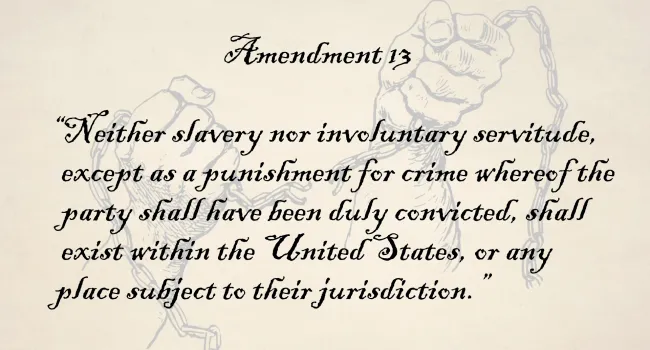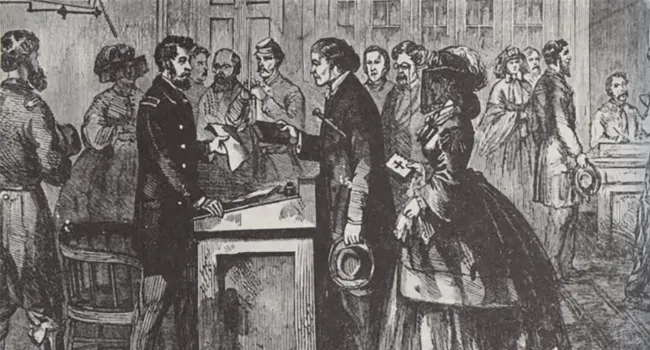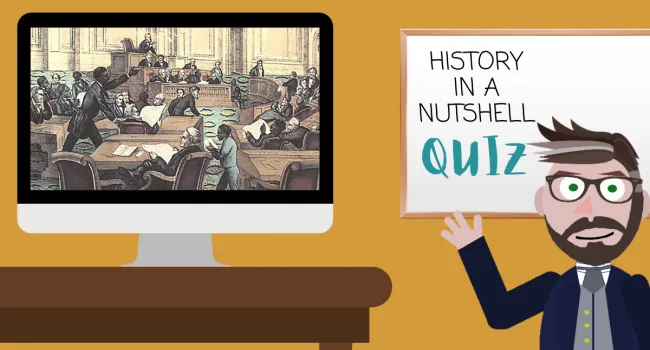Abraham Lincoln: 16th President of the United States - Lincoln led the nation through the American Civil War, the country's greatest moral, cultural, constitutional, and political crisis. He succeeded in preserving the Union, abolishing slavery, bolstering the federal government, and modernizing the U.S. economy.
Andrew Johnson: 17th President of the United States - He favored quick restoration of the seceded states to the Union without protection for the former slaves. This led to conflict with the Republican-dominated Congress, culminating in his impeachment by the House of Representatives in 1868. He was acquitted in the Senate by one vote.
Black Codes: Restrictive laws designed to limit the freedom of African Americans and ensure their availability as a cheap labor force after slavery was abolished during the Civil War. Under black codes, many states required Black people to sign yearly labor contracts; if they refused, they risked being arrested, fined and forced into unpaid labor.
Civil Rights Act of 1964: A landmark civil rights and labor law in the United States that outlaws discrimination based on race, color, religion, sex, national origin, and later sexual orientation and gender identity. It prohibits unequal application of voter registration requirements, racial segregation in schools and public accommodations, and employment discrimination. The act "remains one of the most significant legislative achievements in American history".
Compromise of 1877: An unwritten deal, informally arranged among U.S. Congressmen, that settled the intensely disputed 1876 presidential election. It resulted in the United States federal government pulling the last troops out of the South, and ending the Reconstruction Era. Through the Compromise, Republican Rutherford B. Hayes was awarded the White House over Democrat Samuel J. Tilden on the understanding that Hayes would remove the federal troops whose support was essential for the survival of Republican state governments in South Carolina, Florida and Louisiana.
Confederate Lost Cause Movement: An American pseudo-historical, negationist ideology that advocates the belief that the cause of the Confederate States during the American Civil War was a just and heroic one. This ideology has furthered the belief that slavery was just and moral, because the enslaved were happy, even grateful, and it also brought economic prosperity. The notion was used to perpetuate racism and racist power structures during the Jim Crow era in the American South. It emphasizes the supposed chivalric virtues of the antebellum South.
Cotton Gin: Invented by Eli Whitney in 1793, it is a machine that quickly and easily separates cotton fibers from their seeds, enabling much greater productivity than manual cotton separation.The fibers are then processed into various cotton goods such as calico, while any undamaged cotton is used largely for textiles like clothing. The separated seeds may be used to grow more cotton or to produce cottonseed oil.
Dred Scott v. Sandford Decision: Landmark decision of the US Supreme Court in which the Court held that the US Constitution was not meant to include American citizenship for Black people, regardless of whether they were enslaved or free, and so the rights and privileges that the Constitution confers upon American citizens could not apply to them.
Emancipation Proclamation: Issued by President Abraham Lincoln, the Proclamation declared that as of January 1, 1863, all enslaved people in the states currently engaged in rebellion against the Union “shall be then, thenceforward, and forever free.” Lincoln did not actually free any of the approximately 4 million men, women and children held in slavery in the United States when he signed the formal Emancipation Proclamation. The document applied only to enslaved people in the Confederacy, and not to those in the border states that remained loyal to the Union.
Fifteenth Amendment: The 15th Amendment was ratified on February 3, 1870. It states that “The right of citizens of the United States to vote shall not be denied or abridged by the United States, or by any State, on account of race, color, or previous condition of servitude.”
Fourteenth Amendment: The 14th Amendment to the U.S. Constitution, ratified in 1868, granted citizenship to all persons born or naturalized in the United States—including former enslaved people—and guaranteed all citizens “equal protection of the laws.”
Freedmen's Bureau: Formally known as the Bureau of Refugees, Freedmen and Abandoned Lands, was established in 1865 by Congress to help millions of former black slaves and poor whites in the South in the aftermath of the Civil War. The Freedmen’s Bureau provided food, housing and medical aid, established schools and offered legal assistance. It also attempted to settle former slaves on land confiscated or abandoned during the war. However, the bureau was prevented from fully carrying out its programs due to a shortage of funds and personnel, along with the politics of race and Reconstruction.
Kansas-Nebraska Act: Repealed the earlier Missouri Compromise, created two new territories, and allowed for popular sovereignty. It also produced a violent uprising known as “Bleeding Kansas,” as proslavery and antislavery activists flooded into the territories to sway the vote.
Missouri Compromise: United States federal legislation that stopped northern attempts to forever prohibit slavery's expansion by admitting Missouri as a slave state in exchange for legislation which prohibited slavery north of the 36°30′ parallel except for Missouri. The 16th United States Congress passed the legislation on March 3, 1820, and President James Monroe signed it on March 6, 1820.
Radical Republicans: A faction of the Republican Party during the American Civil War. They were distinguished by their fierce advocacy for the abolition of slavery, enfranchisement of black citizens, and holding the Southern states financially and morally culpable for the war.
Raid on Harper's Ferry: An effort by abolitionist John Brown, from October 16 to 18, 1859, to initiate a slave revolt in Southern states by taking over the United States arsenal at Harpers Ferry, Virginia. It has been called the dress rehearsal for, or tragic prelude to, the Civil War.
Sharecropping: After the Civil War, former slaves sought jobs, and planters sought laborers. The absence of cash or an independent credit system led to the creation of sharecropping. Sharecropping is a system where the landlord/planter allows a tenant to use the land in exchange for a share of the crop. This encouraged tenants to work to produce the biggest harvest that they could, and ensured they would remain tied to the land and unlikely to leave for other opportunities.
Special Field Order 15: Also known as "40 Acres and a Mule", Union General William Tecumseh Sherman issued this order in January 1865. The order confiscated 400,000 acres of land along the Atlantic coast of South Carolina, Georgia, and Florida and divided the land into parcels of not more than 40 acres, on which were to be settled approximately 18,000 formerly enslaved families and other black people then living in the area.
Thirteenth Amendment: Passed by Congress on January 31, 1865, and ratified on December 6, 1865, the 13th amendment abolished slavery in the United States and provides that "Neither slavery nor involuntary servitude, except as a punishment for crime whereof the party shall have been duly convicted, shall exist within the United States, or any place subject to their jurisdiction.".
Three-Fifths Compromise: Compromise agreement between delegates from the Northern and the Southern states at the United States Constitutional Convention (1787) that three-fifths of the slave population would be counted for determining direct taxation and representation in the House of Representatives.
Voting Rights Act of 1965: A landmark piece of federal legislation in the United States that prohibits racial discrimination in voting.





